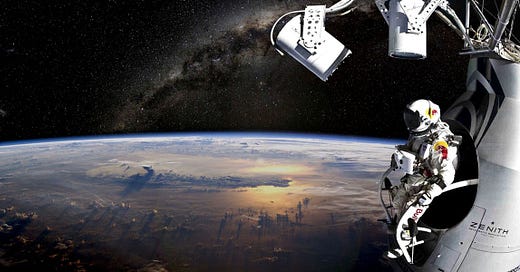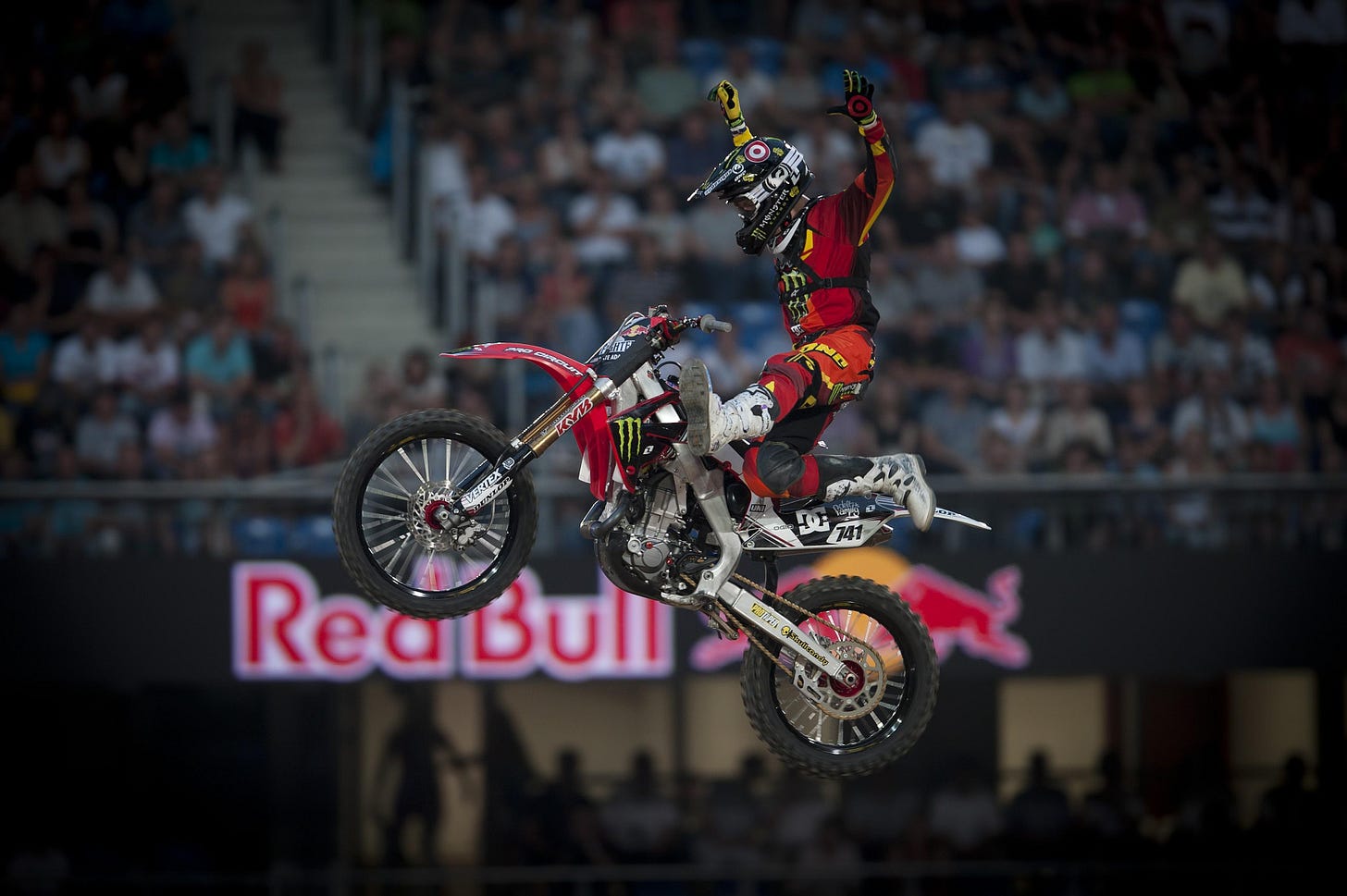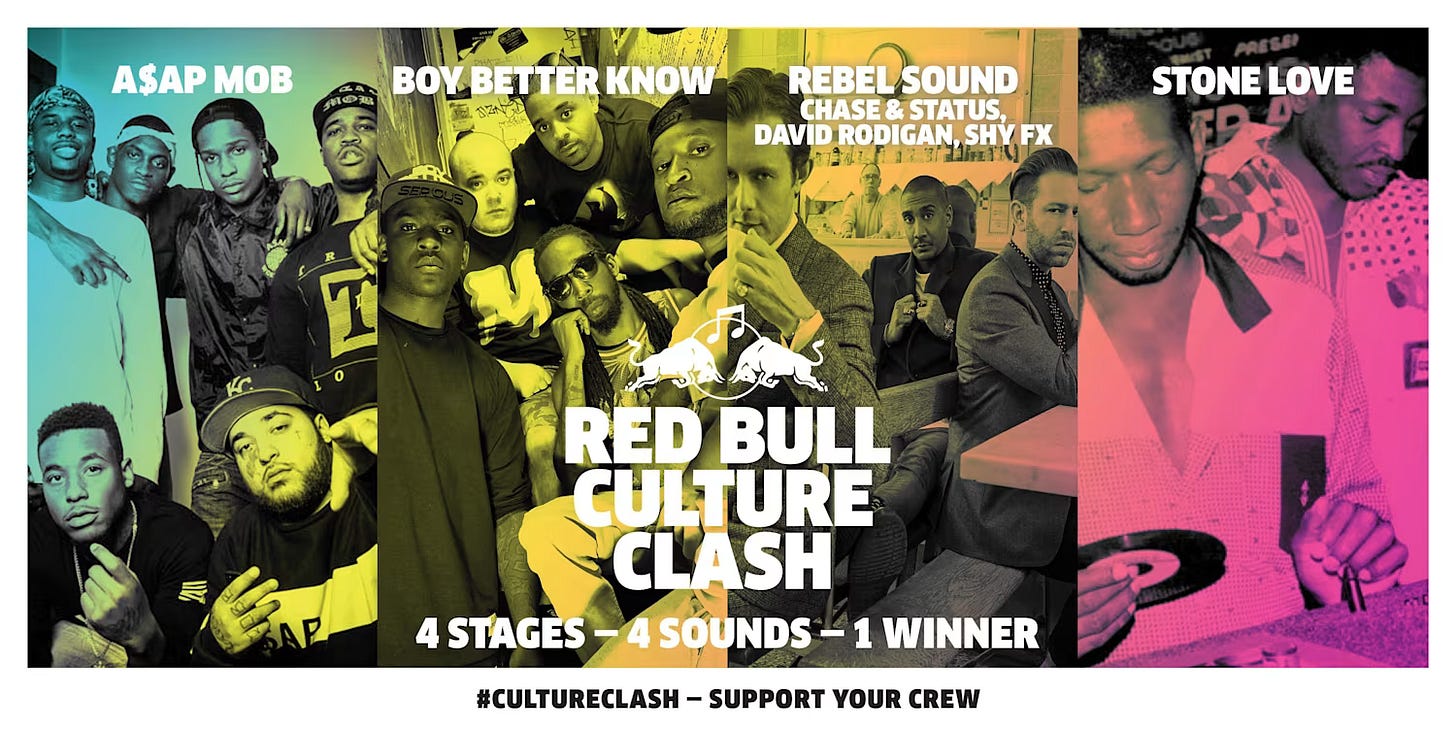On a recent curiosity trip to Lisbon, I was walking with newly made friends when we serendipitously stumbled upon a soundsystem taking over a public space. We followed, to find "RED BULL" branded across a huge gazebo with hundreds of people under it dancing. I thought to myself, “What are Red Bull up to this time?” turns out they were sponsoring an outdoor sports event, and this was just the party to cap off the occasion.
Standing on the dancefloor, I started reflecting on how this is the role Red Bull has played in my life for as long as I can remember: consistently uplifting ‘movement’ in unexpected places, without ever raising doubts about its right to play in these spaces. Red Bull has managed to carve out an authentic place within culture through an applied approach of methodical madness; making it feel like the norm simply by applying this approach consistently over time, building the brand attitude as they go.
Their IRL cultural strategy is unique due to a two-pronged approach: sponsoring the events they choose to align with (borrowing cultural currency) while also producing their own cultural moments (creating cultural currency).
On that dance floor during my anthropological two-step, I had a revelation: All brands should be more like Red Bull. While Red Bull sells energy drinks, they have, for as long as I can recall, been in the business of cultural currency. They achieve this by selling a brand attitude first, with the product as a natural secondary. Their IRL cultural strategy is unique due to a two-pronged approach: sponsoring the events they choose to align with (borrowing cultural currency) while also producing their own cultural moments (creating cultural currency). One day, Red Bull is sponsoring the X Games; the next, they’re launching a man from the stratosphere, and no one questions it. Why? Because it’s Red Bull, this is what they do. Their brand attitude has taken precedence over their product but equally helped them achieve an almost monopoly status in the energy drink sector, creating a clear gap with their category competitors.
During my time in South Africa, Red Bull’s presence in the events space was powerful. Seeing a custom Red Bull truck functioning as a mobile soundsystem in key cities and festivals wasn't rare. We also had Red Bull Music Studios; a space built to support emerging and established artists with free access to professional-grade recording facilities, resources, and collaborative space. And what legends were made there! Other highlights include the Red Bull Culture Clash which saw the likes of A$AP Mob battle it out with Boy Better Know, and the Red Bull Music Academy Weekender, a series of global music festivals hosted in various cities around the world, which came to a sad end in 2019, leaving a noticeable void in the global music scene.
Red Bull has immersed itself in various subcultures worldwide so deeply that its right to be there is unquestioned. What might seem random is, in fact, highly intentional, often because they take the time go beneath the surface, showing up authentically as opposed to a glamourised, clout-driven manner like the Charli XCX & H&M event or Skepta’s Puma event from earlier in the year. Red Bull isn’t competing for your attention on social media, they don’t need to. By constantly showing up in the real world, their social media feed simply becomes a way to showcase their IRL presence. This is what makes their feed so engaging. When you stand out in the world, there’s no need to prove yourself on the internet. Fame follows naturally, both online and offline.
This is a lesson for brands: take a page from Red Bull’s book. Consider your brand attitude; how does it manifest in the real world? How is it flexed without being attached to a product? Most importantly, learn to commit to a long-term approach. Red Bull’s distinct position in culture is the product of years of consistent effort.
We’re already seeing other brands adopt this philosophy. Bottega Veneta, for example, earns fame on social media despite not having any social media accounts. They stay present through talent collaborations and initiatives like funding Air Afrique’s magazine first print magazine and launch event, as well as establishing Accademia Labor et Ingenium, a school for nurturing artisanal talent. And, of course, there’s Moncler Genius, an annual extravaganza where Moncler invites multiple designers and creatives to reimagine its brand. The resulting collections are presented in a spectacular live showcase, becoming Moncler’s most talked-about moment each year, partly thanks to collaborators like Pharrell Williams, Alicia Keys, A$AP Rocky, and Rick Owens who have made this a cultural staple, yielding organically earned fame. But Moncler still isn’t felt or understood like Red Bull; Red Bull gives you wings, Moncler gives you… ?
In a world increasingly plagued by feed fatigue, the battle to stand out on social media has not only become nearly futile but also overly transactional. Brands should aim to be “chronically online” by building offline — earning cultural space and presence in people’s lives in a genuine way.
Funny enough, while I was writing this article, Lethal Shooter, a popular basketball trainer and shooting coach who’s gone viral on social media thanks to his daring and extreme shooting challenges; guess which brand he’s clearly wearing due to sponsorship in most of his videos?;
Do you understand it now?
Put simply: be more like Red Bull.
Until next time,
Yus









Great read! And well timed with RB’s rebooted Culture Clash announcement
"during my anthropological two-step" is one of my favourite lines this year.